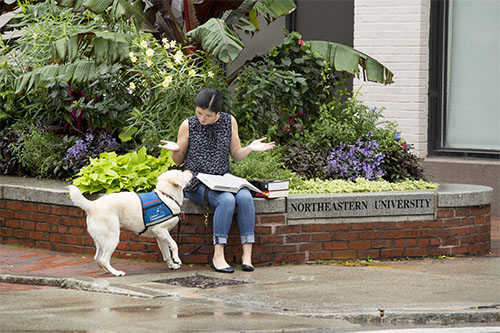Home » Service Dogs » Our Dogs » Hearing Dogs
Hearing Dogs
Learn more about hearing dogs
 Canine Companions hearing dogs are specially bred Labrador and Golden Retrievers who alert partners to key sounds by making physical contact, such as nudging the leg or arm. Among the many sounds hearing dogs can be trained to recognize and respond to can be the sound of a doorbell, alarm clock, a voice of a person calling a name or a smoke alarm.
Canine Companions hearing dogs are specially bred Labrador and Golden Retrievers who alert partners to key sounds by making physical contact, such as nudging the leg or arm. Among the many sounds hearing dogs can be trained to recognize and respond to can be the sound of a doorbell, alarm clock, a voice of a person calling a name or a smoke alarm.
Partnering with a Canine Companions hearing dog can increase feelings of security and self-confidence by heightening awareness of environmental sounds.
After being placed in the home, a graduate “customizes” the dog’s alerting pattern to their own particular environment and needs. Examples include: Alerting to incoming e-mail messages at work, timers on microwaves, dryers and other appliances, and the sound of dropped keys.
In order to be eligible for a hearing dog, an applicant must:
- Be deaf or hard of hearing
- Be 18 years of age or older
- Be independent in mobility
- Be able to demonstrate the ability to safely and effectively control, manage and care for a dog
- Have adequate vision to observe, intervene and manage a dog’s behavior (generally equivalent to DMV license requirements)
- Attend a two-week Team Training class in Santa Rosa, California or Orlando, Florida
- Participate in on-going Canine Companions training and graduate support program
Canine Companions hearing dogs and follow-up services are free of charge.
The process to receive a Canine Companions service dog includes multiple steps. Click the button below to find out if a service dog is right for you, and start the process to receive more information.
Please note: Canine Companions does not train or place dogs for the following; to do guide work for the blind, to do seizure or diabetic alert/response, to anticipate or detect medical symptoms, for the primary benefit of emotional comfort or social support, to recognize and/or manage undesirable human behavior, to provide supervision, navigation, or safety from environmental hazards, to respond aggressively or to provide personal protection.

